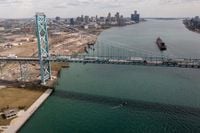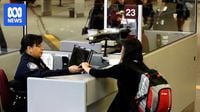As concerns grow over the treatment of travelers at the U.S. border, immigration lawyers are advising Australians to exercise caution when planning trips to the United States. With reports of heightened scrutiny and increased detentions, experts recommend practical steps to help mitigate risks.
Among the suggestions from immigration lawyers are taking a "burner" phone, printing bank statements, and creating detailed travel itineraries. These precautions aim to protect personal information and prepare travelers for potential questioning by U.S. border officials.
"The hype is real," said Melissa Vincenty, managing director of Worldwide Migration Partners. She noted that U.S. Customs and Border Protection (CBP) officials have been encouraged to implement "enhanced vetting" at ports of entry. This includes not just basic questioning but also potentially searching travelers' devices and accessing their social media accounts.
Reports indicate that Australians have faced long detentions at U.S. airports, with some being sent back home without explanation. The Australian government has updated its travel advice, warning that border protection officials possess broad powers to deny entry for any reason, even to those traveling under the visa waiver program (ESTA).
One Australian, identified only as Lachlan, has lived in New York since 2017 and has canceled plans to visit Sydney due to fears of being detained. "I have a whole life and home here. There's a chance I could never see that again," he shared, highlighting the anxiety many feel about U.S. immigration policies.
President Donald Trump's immigration executive order mandates stricter screening for foreign nationals, further intensifying fears among travelers. Vincenty emphasized that authorities have always had the ability to search devices but noted that the current focus is more intense than in the past.
Travelers should be aware that immigration officials are particularly interested in whether visitors might overstay their visas or engage in illegal work. In the past, questions were often limited to the purpose of the visit and proof of funds. Now, officials may conduct more thorough checks, including calling U.S. contacts to verify accommodation details.
"Customs and Border Protection have complete control over who comes in and out of an entry point," said Vincenty. "They can deny entry for any reason, or no reason." This wide discretion has raised alarms among legal experts and travelers alike.
Sherwin Noorian, a principal lawyer at Globalised, a U.S. immigration law practice in Melbourne, urged travelers to adhere strictly to the rules. "Frankly, a lot of Australians do bend the rules of the visa waiver program, and some of them get caught and sent back," he explained. He advised that even a minor misstep could lead to detention or denial of entry.
In a troubling development, some travelers have reported being taken to U.S. immigration detention centers. Renato Subotic, head coach of the Australian mixed martial arts team, claimed he spent 24 hours in an American jail due to a visa mistake. His experience underscores the seriousness of the situation for Australians traveling to the U.S.
Vincenty also highlighted the importance of safeguarding personal information, suggesting that travelers use disposable devices that contain minimal personal data. "It's not like you're trying to hide anything, but do you want a border official to have access to basically your whole life?" she asked.
Concerns extend beyond personal data to political views. Immigration officials have recently targeted international students involved in pro-Palestinian protests, raising fears for activists traveling to the U.S. Noorian noted that such individuals might face additional scrutiny.
The Australian Consulate's assistance in these situations is limited. The Department of Foreign Affairs and Trade states that the consulate cannot intervene in immigration matters or prevent deportations. If travelers are denied entry, they may face five-year bans on reentry.
Entry refusal under the ESTA program does not permanently ban travelers from the U.S., but it does make them ineligible for the visa waiver program. Those denied entry on an E-3 visa, which is available to Australians seeking temporary employment in the U.S., may face more complicated procedures for reentry.
In a related context, Canadian institutions are echoing similar warnings to their employees regarding travel to the U.S. Executives at major Canadian organizations, including the Children’s Hospital of Eastern Ontario, have advised staff to avoid U.S. visits unless absolutely necessary, citing the escalation of issues and volatility in the country.
Alberta Investment Management Corp. has prohibited staff from traveling to the U.S. for business meetings, while the Canadian Association of University Teachers recommends that academics refrain from visiting, especially if they have publicly criticized U.S. policies.
Privacy concerns are at the forefront of these advisories, with Canadian officials warning that U.S. border agents can compel travelers to grant access to personal devices. This has prompted some institutions to suggest using "burner" phones or "clean" laptops that do not retain sensitive information.
As international visitors report increased harassment and detentions at U.S. border crossings, it remains crucial for travelers to stay informed about current U.S. immigration policies and prepare adequately for potential challenges. With the landscape of U.S. border security continuously evolving, vigilance and preparation are key for anyone planning to cross into the United States.






